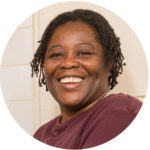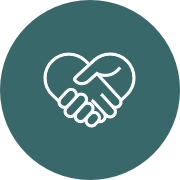
Supportive Housing
James carries his bike down the stairs from his apartment, and gets ready to ride. He zips away from his place in RHD’s Durham Adult Supported Housing in North Carolina seeking — and finding — solace in miles of open road.
“Every day, I’m on my bike,” James said. “It’s therapy for me. It’s like, when I’m going up a hill, I don’t have time to think about anything else. It frees up my mind, because I’m just thinking about getting up the hill. I don’t worry about anything else. I just want to make it up the hill.”
James was not trying to come up with the perfect metaphor for RHD’s approach to supportive housing. But he got pretty close, just the same.
RHD’s supportive housing programs, utilizing the Housing First model, focus on the respect for the dignity and worth of each individual. RHD believes that housing is a basic human right and should not be denied to anyone, and that an individual’s primary need is to obtain safe, affordable and stable housing. Other issues that may affect people can more effectively be addressed once housing is secured.
“A lack of housing creates such stress and instability that it really is a barrier to recovery,” said Bernard Glavin, RHD corporate associate director. “You take away that barrier by providing housing, and other challenges become more manageable. People can just concentrate on getting up that hill.”
RHD works closely and cooperatively with state and local partners to ensure that the best possible services are available to consumers. Staff and participants actively work on fostering positive, productive relationships with landlords, neighbors and other community partners.
From its first supportive housing program for 10 persons in 1995, RHD has expanded this service to include more than 400 persons in nine programs across five states. RHD’s supportive housing programs provide services to persons with diverse backgrounds — most notably those who have struggled with homelessness, long-term or frequent stays in institutional settings and years in large congregate settings.
 On-Time Arrival
On-Time Arrival
In a mental health residential transformation initiative spearheaded by the Philadelphia Department of Behavioral Health, RHD’s Team ARRIVE successfully transitioned 200 clients from living in group homes into supported independent living in their own apartments with services as needed. “RHD saved the day,” said Martha, a Team ARRIVE client. “They saved my life.” Read about Martha, Ralph and Team ARRIVE here.
“We don’t try to force people into a certain approach, like a piece of a puzzle,” said Sheila Highsmith, director of RHD’s Tri-County Supportive Housing. “Sometimes those pieces don’t fit exactly right, and those edges hurt. We make sure our approach is person-centered, and the participants are able to take responsibility for their own lives.”
After years of homelessness and behavioral health challenges, James has maintained his housing with RHD in a community residential program that provides flexible services to people with serious mental illness who are coming out of a psychiatric hospital setting. Residents live in a clustered apartment setting with a focus on the full array of life skills essential for consumers to live successfully in the community.
“I realized I had a life to live; I didn’t have to go back to the life I was living,” James said. “I feel very peaceful. I’ve got something of my own, and it feels great.”
In New Jersey, Leon has maintained his own apartment for four years, living largely independently with the support of a variety of services at RHD.
“You can’t make a better choice than RHD,” he said. “My experience with them has been compassion, providing the things I need and hoping that I can do better and succeed. Having the support of RHD has made it so that I feel like I’m on level ground with everybody else.
“I’ve been at RHD for four years. And, man, I’m hoping for 40 more.”
Maxine is in RHD supportive housing in Raleigh, N.C.
“I’m grateful that RHD exists,” Maxine said. “It’s given me a good, stable environment. You have your own place, but the staff is always there if you need them. My mental health is the best it’s been in over 10 years.
“I told the staff last week that I love it here so much that if the day ever comes when I have to leave for some reason, I’m going to chain myself to the building.”
RHD provides choices for safe, affordable housing that include private homes, scattered-site apartments and clustered apartments, depending on an individual’s need and choice. Once housing is obtained, RHD programs wrap ancillary services around individuals to help them live as independently as possible in the community of their choice.
National studies show that areas embracing Housing First see a decline in the use of crisis services that results in millions of dollars in savings to public systems. Persons in Housing First experience a significant decrease in detox admissions, visits to emergency rooms, incarcerations, and nights spent in emergency shelters. Research indicates that individuals experiencing homelessness are more receptive to treatment after being stabilized in housing because housing enhances self-esteem and a sense of dignity, and individuals are more likely to seek employment and community services.
“I was in and out of the hospital ever since 15 years old,” said Marion, an RHD consumer in North Carolina. “Since I found RHD, I haven’t been doing that. I never thought I’d have my own place, and now I do. I’m happy when I get up every morning. I’m in school; I can read and I can write poems. I have the words now.”
Marion reads her favorite poem, written in her living room of her apartment:
I have hope, being myself
I have hope, seeing my health
I have hope, looking up above
I have hope, seeing love
I have hope, in being strong
I have hope, in not being alone
I have hope, in seeing my way home


